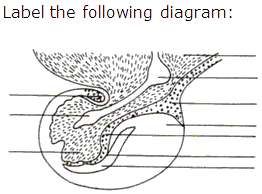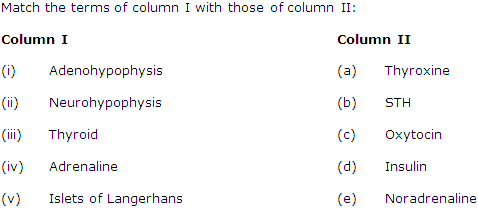FRANK Solutions for Class 10 Biology Chapter 10 - Endocrine System
Chapter 10 - Endocrine System Exercise 128
Question 1
Name the following:
(i) Gland secreting growth hormone
(ii) Growth hormone
(iii) Hormone regulating metamorphosis
(iv) Gland secreting insulin
(v) The largest endocrine gland
(vi) Gland secreting adrenaline
(vii) Anterior lobe of pituitary
(viii) Posterior lobe of pituitary
(ix) The hormone that controls the basal metabolic rate
(i) Gland secreting growth hormone
(ii) Growth hormone
(iii) Hormone regulating metamorphosis
(iv) Gland secreting insulin
(v) The largest endocrine gland
(vi) Gland secreting adrenaline
(vii) Anterior lobe of pituitary
(viii) Posterior lobe of pituitary
(ix) The hormone that controls the basal metabolic rate
Solution 1
(i) Pituitary gland
(ii) Somatotrophin
(iii) Thyroxine
(iv) Pancreas
(v) Liver
(vi) Adrenal gland
(vii) Adenohypophysis
(viii) Neurohypophysis
(ix) Thyroxine
(ii) Somatotrophin
(iii) Thyroxine
(iv) Pancreas
(v) Liver
(vi) Adrenal gland
(vii) Adenohypophysis
(viii) Neurohypophysis
(ix) Thyroxine
Question 2
Give the special function of the following:
(i) Somatotrophic hormone
(ii) Thyroid stimulating hormone
(iii) Adrenocorticotrophic hormone
(iv) Gonadotrophic hormone
(v) Insulin hormone
(vi) Corpus luteum
(vii) Glucagon hormone
(i) Somatotrophic hormone
(ii) Thyroid stimulating hormone
(iii) Adrenocorticotrophic hormone
(iv) Gonadotrophic hormone
(v) Insulin hormone
(vi) Corpus luteum
(vii) Glucagon hormone
Solution 2
(i) Somatotrophic Hormone - It is essential for the normal growth of an organism.
(ii) Thyroid stimulating hormone - It stimulates the activity as well as the growth of thyroid glands.
(iii) Adrenocorticotrophic hormone - It stimulates the activity of adrenal cortex.
(iv) Gonadotrophic hormone - It promotes the growth of ovarian follicles in females and the growth of sperms in males.
(v) Insulin hormone - It lowers the blood sugar level.
(vi) Corpus luteum - It secretes progesterone.
(vii) Glucagon hormone - It raises the blood sugar level.
(ii) Thyroid stimulating hormone - It stimulates the activity as well as the growth of thyroid glands.
(iii) Adrenocorticotrophic hormone - It stimulates the activity of adrenal cortex.
(iv) Gonadotrophic hormone - It promotes the growth of ovarian follicles in females and the growth of sperms in males.
(v) Insulin hormone - It lowers the blood sugar level.
(vi) Corpus luteum - It secretes progesterone.
(vii) Glucagon hormone - It raises the blood sugar level.
Question 3
Select the odd one out of the following:
(i) TSH, ACTH, Insulin
(ii) FSH, LH, STH
(iii) Adenohypophysis, Neurohypophysis, Islets of Langerhans
(iv) Insulin, Glucagon, STH
(v) Adrenaline, Noradrenaline, Insulin
(i) TSH, ACTH, Insulin
(ii) FSH, LH, STH
(iii) Adenohypophysis, Neurohypophysis, Islets of Langerhans
(iv) Insulin, Glucagon, STH
(v) Adrenaline, Noradrenaline, Insulin
Solution 3
(i) Insulin
(ii) STH
(iii) Islets of Langerhans
(iv) STH
(v) Insulin
(ii) STH
(iii) Islets of Langerhans
(iv) STH
(v) Insulin
Question 4
Expand the following biological abbreviations:
(i) FSH (ii) LTH
(i) FSH (ii) LTH
Solution 4
(i) FSH - Follicle stimulating hormone
(ii) LTH - Luteotropic hormone
(ii) LTH - Luteotropic hormone
Question 5

Solution 5

Chapter 10 - Endocrine System Exercise 129
Question 1
Define the following:
(i) Diabetes mellitus
(ii) Beta cells
(iii) Exophthalmic goiter
(iv) Releasing hormones
(i) Diabetes mellitus
(ii) Beta cells
(iii) Exophthalmic goiter
(iv) Releasing hormones
Solution 1
(i) Diabetes mellitus - Diabetes mellitus is a disease caused by the deficiency of insulin hormone.
(ii) Beta cells - Beta cells are the cells of pancreas that secrete insulin.
(iii) Exophthalmic goitre - The over activity of thyroid gland leads to its enlargement, producing a big swelling in the neck region called exophthalmic goiter.
(iv) Releasing hormones - A substance produced by the hypothalamus that is capable of accelerating the secretion of a given hormone by the anterior pituitary gland.
(ii) Beta cells - Beta cells are the cells of pancreas that secrete insulin.
(iii) Exophthalmic goitre - The over activity of thyroid gland leads to its enlargement, producing a big swelling in the neck region called exophthalmic goiter.
(iv) Releasing hormones - A substance produced by the hypothalamus that is capable of accelerating the secretion of a given hormone by the anterior pituitary gland.
Question 2
Which glands are responsible for the following disease?
(i) Goitre (ii) Diabetes mellitus (iii) Gigantism
(iv) Diabetes insipidus (v) Cretinism (vi) Exophthalmic goiter
(i) Goitre (ii) Diabetes mellitus (iii) Gigantism
(iv) Diabetes insipidus (v) Cretinism (vi) Exophthalmic goiter
Solution 2

Question 3
Name the hormone which controls (reduces) the level of glucose in blood, and the gland which secretes it?
Solution 3
Insulin secreted by pancreas controls the level of glucose in blood.
Question 4
Explain briefly, why adrenaline is called the emergency hormone?
Solution 4
Adrenaline is called an emergency hormone because it brings rapid physiological responses to emergencies like danger, fear or other situations requiring vigorous action.
Question 5
Name the hormones secreted by the following glands:
(i) Anterior pituitary
(ii) Testes
(iii) Ovary
(iv) Adrenal cortex
(v) Pancreas
(i) Anterior pituitary
(ii) Testes
(iii) Ovary
(iv) Adrenal cortex
(v) Pancreas
Solution 5

Question 6
Make a table indicating the glands, hormones produced, their main functions and diseases caused due to their hypo and hypersecretions.
Solution 6

Question 7
Write briefly about
(i) Exophthalmic goitre (symptoms and cause).
(ii) Diabetes mellitus (symptoms and cause).
(i) Exophthalmic goitre (symptoms and cause).
(ii) Diabetes mellitus (symptoms and cause).
Solution 7
(i) Exophthalmic goitre - It is caused due to over activity of thyroid gland.
Symptoms are - Enlargement and protrusion of the gland below the chin, increased pulse rate, nervousness and bulging of the eyes.
(ii) Diabetes mellitus - It is caused due to less secretion of the insulin hormone.
Symptoms are - Frequent urination, Sudden weight gain or weight loss, Excessive thirst and hunger.
Symptoms are - Enlargement and protrusion of the gland below the chin, increased pulse rate, nervousness and bulging of the eyes.
(ii) Diabetes mellitus - It is caused due to less secretion of the insulin hormone.
Symptoms are - Frequent urination, Sudden weight gain or weight loss, Excessive thirst and hunger.
Question 8
Write brief statement explaining the following: People living in hilly region usually suffer from simple goitre.
Solution 8
In hilly region, water has less iodine which is required for the production of thyroxine. So due to the deficiency of thyroxine, people suffer from goiter.
Question 9
Insulin is injected into the body of a highly diabetic patient and not given orally. Comment
Solution 9
Insulin is a protein hormone and if it is given orally it would be digested upon by the protein digesting enzymes in the alimentary canal.
Question 10
(i) Name the endocrine cells present in the pancreas.
(ii) Name two hormones secreted by the above mentioned cells.
(iii) Mention one main function of each hormone named above.
(ii) Name two hormones secreted by the above mentioned cells.
(iii) Mention one main function of each hormone named above.
Solution 10
(i) The endocrine cells present in pancreas are: alpha cells, beta cells and delta cells.
(ii) Insulin and glucagon.
(iii) Insulin - It lowers the glucose level in the blood.
Glucagon - It raises the level of glucose in the blood.
(ii) Insulin and glucagon.
(iii) Insulin - It lowers the glucose level in the blood.
Glucagon - It raises the level of glucose in the blood.
Question 11
Name the hormone responsible for the following functions:
(i) Increase in heartbeat
(ii) Maintains glucose level in the blood
(iii) Converting glycogen to glucose
(iv) Regulates basal metabolism
(v) Ossification of bones
(vi) Prepares the body during emergency
(vii) Responsible for normal growth of the whole body
(viii) Regulates the functioning of the male and female reproductive organs
(ix) Increased reabsorption of water in the kidneys
(x) Increased blood supply to muscles.
(i) Increase in heartbeat
(ii) Maintains glucose level in the blood
(iii) Converting glycogen to glucose
(iv) Regulates basal metabolism
(v) Ossification of bones
(vi) Prepares the body during emergency
(vii) Responsible for normal growth of the whole body
(viii) Regulates the functioning of the male and female reproductive organs
(ix) Increased reabsorption of water in the kidneys
(x) Increased blood supply to muscles.
Solution 11
(i) Adrenaline
(ii) Insulin
(iii) Glucagon
(iv) Thyroxine
(v) Calcitonin
(vi) Adrenaline
(vii) Growth stimulating hormone
(viii) Sex corticoids
(ix) Antidiuretic hormone
(x) Non adrenaline
(ii) Insulin
(iii) Glucagon
(iv) Thyroxine
(v) Calcitonin
(vi) Adrenaline
(vii) Growth stimulating hormone
(viii) Sex corticoids
(ix) Antidiuretic hormone
(x) Non adrenaline
Question 12

Solution 12
(i) (b)
(ii) (c)
(iii) (a)
(iv) (e)
(v) (d)
(ii) (c)
(iii) (a)
(iv) (e)
(v) (d)
Question 13
Which one of the following statements is true/ false?
(i) Diabetes is caused due to insulin deficiency.
(ii) Insulin is secreted by thyroid.
(iii) Islets of Langerhans are found in the brain.
(iv) Adrenaline is secreted by pituitary.
(v) The pituitary gland is both exocrine and endocrine in function.
(i) Diabetes is caused due to insulin deficiency.
(ii) Insulin is secreted by thyroid.
(iii) Islets of Langerhans are found in the brain.
(iv) Adrenaline is secreted by pituitary.
(v) The pituitary gland is both exocrine and endocrine in function.
Solution 13
(i) True
(ii) False
(iii) False
(iv) False
(v) False
(ii) False
(iii) False
(iv) False
(v) False
Question 14
Define the following:
(i) Hormone
(ii) Endocrine gland
(iii) Exocrine gland
(iv) Hypothyroidism
(v) Hyperglycemia
(vi) Hypersecretion
(i) Hormone
(ii) Endocrine gland
(iii) Exocrine gland
(iv) Hypothyroidism
(v) Hyperglycemia
(vi) Hypersecretion
Solution 14
(i) Hormone - The secretions of endocrine glands which are carried by blood to the target organs are called hormones.
(ii) Endocrine gland - The glands without ducts which secrete hormones are called endocrine glands.
(iii) Exocrine gland - The glands with ducts which secrete enzymes are called exocrine glands.
(iv) Hypothyroidism - It is the under secretion of thyroxine by thyroid gland which leads to retarded growth and mental development in infants.
(v) Hyperglycemia - Increase in blood sugar level is called hyperglycemia.
(vi) Hypersecretion - The over activity of any gland leads to over secretion of hormones called hypersecretion.
(ii) Endocrine gland - The glands without ducts which secrete hormones are called endocrine glands.
(iii) Exocrine gland - The glands with ducts which secrete enzymes are called exocrine glands.
(iv) Hypothyroidism - It is the under secretion of thyroxine by thyroid gland which leads to retarded growth and mental development in infants.
(v) Hyperglycemia - Increase in blood sugar level is called hyperglycemia.
(vi) Hypersecretion - The over activity of any gland leads to over secretion of hormones called hypersecretion.
Question 15
Name the hormone produced by the following glands giving one function of each:
(i) Thyroid (ii) Pancreas (iii) Adrenal medulla
(i) Thyroid (ii) Pancreas (iii) Adrenal medulla
Solution 15

Chapter 10 - Endocrine System Exercise 130
Question 1
Choose the correct answer:
(i) Which one of the following is a hormone deficiency disease?
(a) Scurvy (b) Diabetes (c) Cancer (d) Malaria
(ii) Adrenaline is secreted by
(a) thymus (b) adrenal gland (c) islets of Langerhans (d) thyroid
(iii) A gland having endocrine as well as exocrine function is
(a) pituitary (b) adrenal (c) thyroid (d) pancreas
(iv) Excess secretion of growth hormone causes
(a) myxodema (b) gigantism (c) pneumonia (d) goiter
(v) Hormone secreted by islets of Langerhans.
(a) Insulin
(b) ACTH
(c) TSH
(d) STH
(vi) Which one of the following is not an endrocine gland?
(a) Thyroid
(b) Liver
(c) Pancreas
(d) Thymus
(vii)An organ, tissue or cell where a hormone produces its effects is known as
(a) effector
(b) imitator
(c) target
(d) all the above
(viii) Diabetes mellitus disease is caused due to
(a) over secretion of insulin
(b) over secretion of glucogen
(c) under secretion of insulin
(d) under secretion of both
(ix) Insulin is secreted by
(a) beta cells of pancreas
(b) alpha cells of pancreas
(c) delta cells of pancreas
(d) none of the above
(x) Which hormone produces energy producing effect in the body?
(a) FSH
(b) growth hormone
(c) adrenalin
(d) glucagon
(xi) Corpus luteum produces
(a) oestradial
(b) testosterone
(c) progesterone
(d) cortisol
(i) Which one of the following is a hormone deficiency disease?
(a) Scurvy (b) Diabetes (c) Cancer (d) Malaria
(ii) Adrenaline is secreted by
(a) thymus (b) adrenal gland (c) islets of Langerhans (d) thyroid
(iii) A gland having endocrine as well as exocrine function is
(a) pituitary (b) adrenal (c) thyroid (d) pancreas
(iv) Excess secretion of growth hormone causes
(a) myxodema (b) gigantism (c) pneumonia (d) goiter
(v) Hormone secreted by islets of Langerhans.
(a) Insulin
(b) ACTH
(c) TSH
(d) STH
(vi) Which one of the following is not an endrocine gland?
(a) Thyroid
(b) Liver
(c) Pancreas
(d) Thymus
(vii)An organ, tissue or cell where a hormone produces its effects is known as
(a) effector
(b) imitator
(c) target
(d) all the above
(viii) Diabetes mellitus disease is caused due to
(a) over secretion of insulin
(b) over secretion of glucogen
(c) under secretion of insulin
(d) under secretion of both
(ix) Insulin is secreted by
(a) beta cells of pancreas
(b) alpha cells of pancreas
(c) delta cells of pancreas
(d) none of the above
(x) Which hormone produces energy producing effect in the body?
(a) FSH
(b) growth hormone
(c) adrenalin
(d) glucagon
(xi) Corpus luteum produces
(a) oestradial
(b) testosterone
(c) progesterone
(d) cortisol
Solution 1
(i) (b) Diabetes
(ii) (b) Adrenal gland
(iii) (d) Pancreas
(iv) (b) Gigantism
(v) (a) Insulin
(vi) (b) Liver
(vii) (c) Target
(viii) (c) under secretion of insulin
(ix) (a) beta cells of pancreas
(x) (d) glucagon
(xi) (c) progesterone
(ii) (b) Adrenal gland
(iii) (d) Pancreas
(iv) (b) Gigantism
(v) (a) Insulin
(vi) (b) Liver
(vii) (c) Target
(viii) (c) under secretion of insulin
(ix) (a) beta cells of pancreas
(x) (d) glucagon
(xi) (c) progesterone

0 comments:
Post a Comment